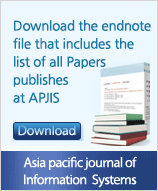The Journal for Information Professionals
Asia Pacific Journal of Information Systems (APJIS), a Scopus and ABDC indexed journal, is a
flagship journal of the information systems (IS) field in the Asia Pacific region.
ISSN 2288-5404 (Print) / ISSN 2288-6818 (Online)
Editor : Youngsok Bang
Information for Authors
- Ethics in Research
-
Objectives
This code of ethics is aimed at preventing misconduct in research by providing the essential ethical standards necessary for manuscripts submitted to and published in APJIS and by supplying rules on decisions and procedures for those manuscripts for which suspicions of plagiarism are raised.
Definition of Plagiarism
Plagiarism is defined here as an act of using ideas or words from another article that has already been published in a journal or book without proper citation or crediting of its source, thereby, misleading readers to overestimate the academic contribution of an article.
Types of Plagiarism
Plagiarism is classified into two types.
1) Simple Plagiarism
Simple plagiarism is an act of borrowing the whole or a part of an original research output, by way of directly copying or superficially paraphrasing an original expression without proper citation, thus giving the misconception that the intellectual property is one's own. It also includes an act of publishing a translation of the whole or a part of an article published in a foreign language without proper citation. It also includes copying a significant part of a source article without using quotation marks even if credit has been given to the source.
2) Self-Plagiarism
Self-plagiarism is an act of presenting the whole or a part of one's own research output that has already been published without citing the original source, thus providing the misconception that the work is new and thereby acquiring double recognition for a single research output.
Investigation on Plagiarism and Judgment
1) Once a suspicion of plagiarism is raised on a published or accepted article, the editor-in-chief forms
the Research Ethics Special Committee. The primary role of the Research Ethics Special Committee is to judge whether an article has been plagiarized or not. The Committee consists of five to seven members and must include two or more members from outside the editorial board.
2) As the first step, the Research Ethics Special Committee should internally evaluate a suspicion of
plagiarism on a published or accepted article within 30 days. Then the Committee should give a rebuttal period of 30 days to the author(s) of the article under suspicion in order to defend his/her/their position before the Committee make a final decision on the plagiarism by a 2/3 vote of the entire committee members.
3) When a suspicion of plagiarism is raised during a review process, the editor-in-chief should solicit an
opinion from an associate editor and the reviewer and then give a rebuttal period of 30 days to the author(s) before judging plagiarism.
Course of Actions and Procedures on Plagiarized Articles
1) For an article that has been accepted for publication or is still in a review process, judging by the
significance of the plagiarism, the editor-in-chief can request the author(s) to revise the article and give another opportunity for review or the editor-in-chief can decline a review and return the article to the author(s).
2) For an article that has already been published, the editor-in-chief should report the related matters
to the President of the Korea Society of Management Information Systems (the Association, hereafter) including the raising of a suspicion of plagiarism, any related major developments in the handling process, and the judgment made by the Research Ethics Special Committee. The president then reports the matters to the board of directors. The board of directors determines actions corresponding to whether plagiarism has been committed or not and to how serious the plagiarism was that occurred.
3) When the final actions by the board of directors includes the revocation of the article's publication,
in accordance with Article 9 and Clause 1 of Article 9 of "the Management Guide on the Listed Articles" by the Korean Research Foundation, the Association must remove the article from the list of articles published in the APJIS, ban any future submissions of manuscripts by the involved author(s) to the APJIS for the following three years, announce the above facts on the webpage of the Association as well as in the subsequent issue of the APJIS, and report the related matters to the Korea Research Foundation.
4) When the final actions taken by the board of directors do not include a revocation of the article's
publication, the Association may, when deemed necessary, announce the related matters on both the webpage of the Association and in the subsequent issue of the APJIS.
Preparation and Storage of Related Documents
1) Documents related with investigations, judgments, and actions on plagiarism must be archived in
the following three categories.
① Logs on investigations of plagiarism
② Evaluation documents by the Research Ethics Special Committee and its reports to both the
Association and the board of directors
③ Discussions, decisions, and actions by the board of directors
2) Anonymity must be guaranteed in all matters related to reports of suspicion and investigations into
plagiarism. For this purpose, for each case two copies of related documents with the involved person's name (or persons' names) being removed must be created and kept, respectively, one by the executive office and one by the editorial board. The original document that states the involved person's name (or persons' names) must be kept permanently by the editor-in-chief.
By-Laws
1) Effective Date
① The ethics code shall be effective from the date of enactment.
② The amended code shall be effective from the date of amendment
③ The ethics code was lastly updated on October 1, 2014
Home l Site Map l Abstracting/Indexing l FAQ l Publisher l Contact Us l Admin Login
© 2013 The Korean Society of Management Information Systems. All rights reserved.












 Submission of a paper to the Asia Pacific Journal of Information Systems for possible publication means that the authors certify that the manuscript has not been published previously nor is currently submitted for publication elsewhere. All legal responsibilities and duties about the contentss of the work belong to the authors.
Submission of a paper to the Asia Pacific Journal of Information Systems for possible publication means that the authors certify that the manuscript has not been published previously nor is currently submitted for publication elsewhere. All legal responsibilities and duties about the contentss of the work belong to the authors. Submitted manuscripts are reviewed by at least two reviewers nominated by the editorial board.
Submitted manuscripts are reviewed by at least two reviewers nominated by the editorial board. If all reviewers agree to recommend the publication of a manuscript, the manuscript will be accepted for publication. If not, the editor-in-chief confers with the associate editor who handles the manuscript and oversees deliberation in the editorial board meeting.
If all reviewers agree to recommend the publication of a manuscript, the manuscript will be accepted for publication. If not, the editor-in-chief confers with the associate editor who handles the manuscript and oversees deliberation in the editorial board meeting. The journal can request minor and/or major revisions to the manuscript.
The journal can request minor and/or major revisions to the manuscript. Copyrights to make digital and/or hard copy of, republish, and redistribute part or all of the work belong to the Asia Pacific Journal of Information Systems. All legal issues related to copyrights are the responsibility of the authors.
Copyrights to make digital and/or hard copy of, republish, and redistribute part or all of the work belong to the Asia Pacific Journal of Information Systems. All legal issues related to copyrights are the responsibility of the authors. 





